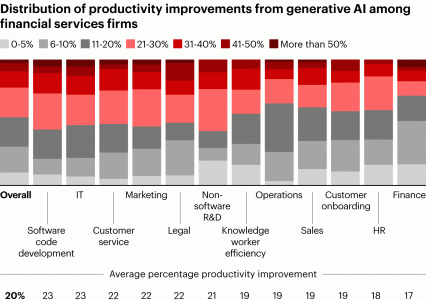Large banks, insurers, and other financial services firms are leading in investment and adoption of generative AI technology compared to companies in other industries. We’re talking about sums that in 2024 reached nearly €22.1 million, and the involvement of 270 full-time employees on average, among those with revenues of at least $5 billion—compared to $17.6 million among their counterparts in other sectors. The 10 largest financial companies analyzed would invest an average of more than $100 million in 2024. This is one of the main conclusions drawn from a recent survey conducted by Bain & Company among 109 U.S. financial services firms.
According to Santiago Casanova, partner in Financial Services at Bain & Company Spain, “Although the sample was conducted in the United States, the macro results are not far from what is happening in the financial sector in other countries, including Spain—especially in terms of productivity gains from the application of generative AI. In any case, smart technology choices alone will not drive the full transformation of the sector. True adoption requires a deep cultural shift. At Bain, we help our clients in the financial sector strategically assess and apply use cases to improve efficiency and customer loyalty, among other factors, and to move forward on the path toward that necessary change.”
Regarding the impact of generative AI on the productivity of the financial services firms analyzed, Bain & Company found that it results in a global average increase of 20%, considering all areas in which it has been used (software development, IT, customer service, marketing, legal department, operations, etc.), as shown in the following table:

Despite the clear positive impact of generative AI implementation, financial services firms remain reluctant to accelerate their pace of adoption due to several issues, such as regulatory uncertainty and concerns over data quality and security. These concerns are more prevalent among financial services firms than in less regulated sectors and cast doubt on the return of the investments made.
“To succeed with AI tools at scale, financial services firms will need to engage in dialogue with regulators and develop deeper expertise at the intersection of regulation, data security, and privacy. This will require more deliberate governance around compliance, task allocation, and individual roles,” explained Casanova.
Firms in the financial sector will also need to attract and develop the right talent. In this regard, nearly 70% of respondents stated that there are talent gaps across all functions related to AI implementation, especially in technical, risk, and compliance areas.
Centralizing and Building: Two Clear Trends
Bain & Company also found that almost half of the financial services firms analyzed fully or partially centralize their AI-related decision-making processes. For companies using a hybrid model, it is common to centralize strategy and governance while decentralizing execution.
Furthermore, when choosing between buying or building their own generative AI solutions, most financial services firms surveyed said they had developed their own solutions across all applications—at a slightly higher rate than in other sectors. Many applications are developed in-house either because commercial versions are not yet ready or because firms want greater control over their solutions. In any case, third-party offerings are becoming increasingly sophisticated and relevant to this highly regulated sector, so the number of companies opting to buy rather than build is expected to grow.
“In general, our analysis suggests that financial services firms have already reaped benefits from generative AI and expect to gain even more. Therefore, they are making significant investments in talent and other resources. In any case, although progress is rapid, we are still in the very early stages of a technology that promises to further improve operations and customer experience,” concluded Santiago Casanova.



